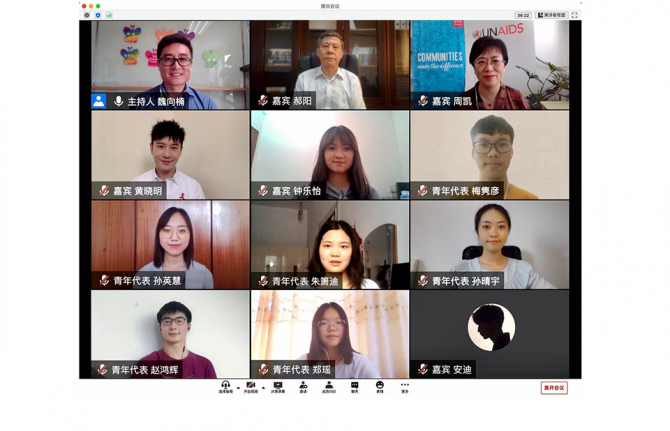

Feature Story
Chinese young people take centre stage on HIV prevention
13 October 2020
13 October 2020 13 October 2020“There were no such diseases back in the day! AIDS came into being only because of college kids like you messing around,” shouted an old man at a group of students who were speaking to people about HIV prevention at China’s West Lake beauty spot. “Behave yourselves! We don't need to listen to your rubbish!”
In 2020, almost three years later, Zhao Honghui, the group leader and a medical student in his third year at Zhejiang University, still remembers every word, but he knew he didn’t do anything wrong. “I wanted to tell the old man that actually new HIV infections among old people are also increasing,” he said. “And that hatred and denial are never the solution to HIV.”
Recently, Mr Zhao had the opportunity to say what he had wanted to say and speak about all the experiences, good and bad, he had as a HIV prevention volunteer, speaking to a live online audience of more than 71 000 people from across China.
He and five other young HIV volunteers joined an online dialogue on youth and HIV organized by UNAIDS and Tencent, a Chinese technology company, one of a series of youth dialogues organized by the United Nations in China and Tencent to mark International Youth Day and the United Nations’ 75th anniversary that enabled Chinese young people to speak their minds about the Sustainable Development Goals.
In China, according to government statistics, new HIV infections among young people aged 15–24 years have been on the rise over the past few years. By inviting young volunteers to share their stories, the UNAIDS dialogue aimed to raise awareness among young people about the risk of HIV infection, tell them how to protect themselves and other people and encourage more young people to engage in HIV prevention work.
Mei Junyan, a second-year student from the South China University of Technology, shared his experience as a peer educator on sexuality education and HIV prevention. Sun Yinghui, from Zhongshan University, told the audience how her medical research team had looked at COVID-19’s impact on people living with HIV and how to help them address the challenges. “I see hope because the dialogue made me realize that I’m not alone in this battle,” said Ms Sun. “It’s an inspirational dialogue for all of us who are devoted to HIV prevention,” said Mr Mei.
They also had good interactions with the guest speakers. UNAIDS China Goodwill Ambassador Huang Xiaoming, an actor, said it was not easy to be a volunteer. The Director of the Chinese Association of STD and AIDS Prevention and Control, Hao Yang, encouraged all the participants to continue what they are doing. He said peer education is complementary with school education and he encouraged students to do more volunteer work.
One special guest was Andy Liu (not his real name). He contracted HIV five years ago, when he was 21 years old. Now he has an undetectable viral load after taking and adhering to antiretroviral therapy and has become a volunteer to help other people living with HIV. Unfortunately, however, he felt that had to turn his camera off to hide his identity, as stigma against people living with HIV is still prevalent in China. A touching moment came at the end of the dialogue when Mr Huang told Mr Liu that he hoped that one day he would not be afraid to show his face. He said he believes that day will come soon and he will continue to speak for people living with HIV and to advocate against stigma and discrimination.
Mr Zhao hopes the youth dialogue will become an annual event where young HIV volunteers can exchange ideas. “This dialogue is useful for us to know what other volunteers are doing and to learn from each other. I thank UNAIDS for providing this platform and I hope it can become a regular event,” he said.
Amakobe Sande, the UNAIDS Country Director for China, said that UNAIDS is committed to serving young people, together with the Chinese Government and community-based organization partners. “I hope the young people at today’s dialogue will inspire more people to join our efforts too. Together we can achieve an HIV-free generation. We can end AIDS as a public health threat.”



